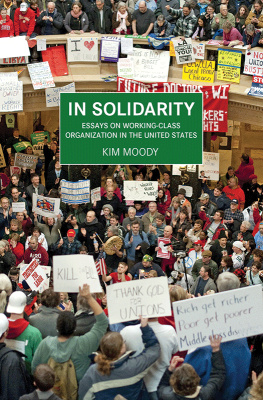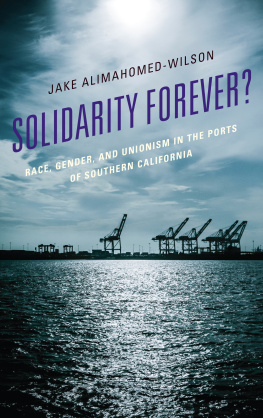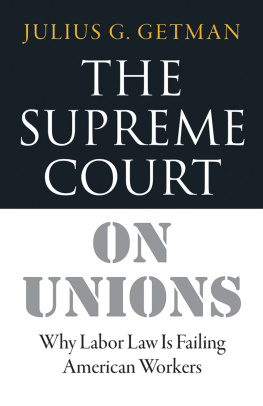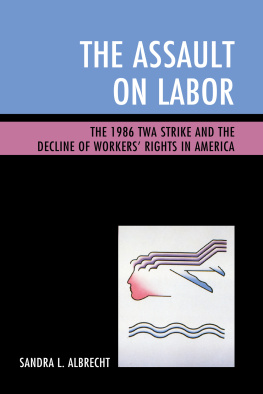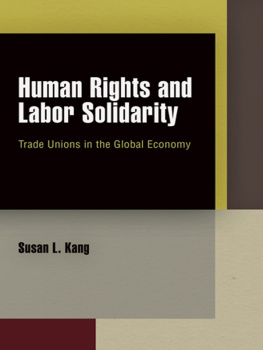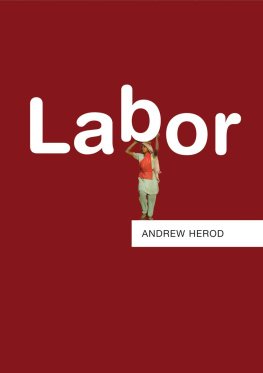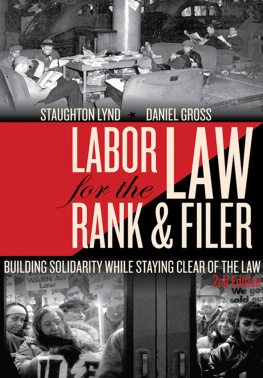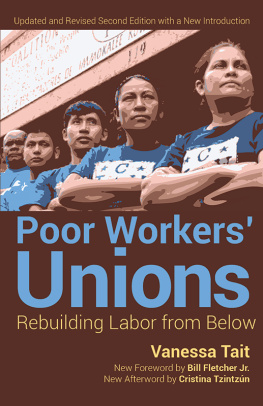CONTENTS
List of Figures and Tables
Preface
Acknowledgments
Acronyms
1. Introduction
2. Segmented Production, Fragmented Labor
3. Transnational Activist Campaigns and the Anti-Sweatshop
Movement in El Salvador and Honduras
4. Labors Radical Flank Mechanism in Central America
5. Transnational Labor Networks in the Brazilian Auto Industry
6. Microcorporatism in Argentine and Brazilian Auto Plants
7. Conclusion
Notes
References
FIGURES AND TABLES
Figures
: Labors four responses to globalization
: Traditional versus segmented production regimes
: Model of export processing zones
: El Salvador: Segmentation and unionization rates
in manufacturing
: Central America and DR apparel and textile exports
to the United States
: Auto industry: Model of modular production
: Brazil: Motor vehicle production and employment
: Argentina: Motor vehicle production and employment
: The triangle of power and labors tri-level strategy
: Example of labors tri-level strategy
: The radical flank mechanism in El Salvador and Honduras
Tables
: Global commodity chain internationalism
: Brazil: Wages and unionization in traditional and
modular auto plants
: Argentina: Wages and unionization in traditional and
modular auto plants
: Left labor actions to form unions in apparel export plants
: Moderate labor actions to form unions in apparel
export plants
: Brazil: Transnational labor activities by factory
: Unionization in the Brazilian auto sector
: Unionization in the Argentine auto sector
PREFACE
This book is a product of both lived experiences and careful academic research and analysis. My years in academia have given me a profound appreciation for the rigors of the scholarly enterprise, with its attention to methods, data collection, and analysis. My decade in Latin America, where I often lived with workers and their families, and spent countless nights with workers at strike sites, have given me many insights into the thoughts, beliefs, and ideas that shape their actions. What I have learned is that in order to understand how people act we must know something not only about their economic and political contexts, but also about how they see themselves and others in society.
I also believe that, just as it is important to know the lived experiences of the subjects of our writings in order to better understand their actions, so too is it useful to know something about the experiences of the authors who write about them, especially if those experiences are particularly pronounced. So let me say a little about some of the experiences that have influenced me and ideas that have made their way into this book.
My college years were marked by the Central American wars of the 1980s. These wars might not have mattered that much to me if it had not been for a new law requiring young men to register for the draft. That hit close to home. I began taking Latin American history courses and paying more attention in Spanish class. My first real activism was in the Central America solidarity movement. Soon after graduating, I developed another interest: I was given the opportunity to work with a local labor union to organize a large hotel and restaurant in the Boston area. In coordination with two skilled union organizers from the local chapter of the Hotel Employees and Restaurant Employees union, I endeavored to establish a union from the inside as a busboy. But after nine months the union leadership decided to shift its attention and get out the vote for a local election in which the union president was running. Union representatives told me that they might return to the organizing effort in six months. In union organizing work, this is an eternity. The campaign was over, and I needed to move on.
I learned that a progressive union in El Salvador was looking for a bilingual activist to work with it in San Salvador, the countrys capital. My two passions, labor and Central America, seemed to have come together for me in one opportunity. El Salvador was in the midst of a civil war, and government arrests and death squad killings of unionists were on the rise at the time. The Salvadoran unionists realized that their survival depended not only on their organizing ability, but also on the solidarity of international labor unions and human rights organizations. Yet, with Spanish as their only language, communication was a problem. The unionists needed someone to help send off urgent action alerts in English whenever a unionist was arrested or killed, or some other emergency presented itself to solidarity groups in Europe, the United States, and Canada.
Foreign solidarity groups were asked to pressure the Salvadoran state to punish those responsible for the killings and to release those unionists who were unjustly imprisoned. The hope was not only that the culpable parties would be punished, but also that the protest would create deterrence to future repression. International solidarity in this context was a very political affair; the state was most often the direct target of the protest movement. But it was also a high-stakes and basic affair. It was about fundamental human rights and activists survival.
The job provided no salary or benefits, but I would be given three meals a day at the union cafeteria. Sleeping accommodations would be provided on the cement floor in the back of the building, at least until other arrangements could be worked out. Old protest banners could be used as blankets. Work would be seven days a week and often go well into the night.
Although it was not a job description that I was willing to share with my parents, I was twenty-four at the time and it all sounded perfectly fine to me. There was a clear and urgent need for the solidarity work I could provide, and everyone working for the union was there because they were deeply committed to what they were doing.
Weeks after arriving, I moved into the apartment of a former textile worker turned union leader who lived with his family in the working-class Zacamil housing projects. I was given a space with a cot behind a partition in the kitchen. During the day I worked in the office communicating with U.S. and European activists about the latest abuses against unionists. Many nights were spent at strike sites. Striking workers stayed at work centers at night to prevent state security forces from taking over the installations and returning them to the employers. The strikes gave me the opportunity to have countless hours of conversations with workers.
After a few weeks in the country, I met the representative for Latin America of the Norwegian Confederation of Trade Unions (LO-Norway). As residents of a small, progressive European country with more powerful neighbors, Norwegian unionists appreciated some of the challenges facing El Salvador. With generous collaboration from the Norwegian government, LO-Norway provided much of the funds allowing the progressive Salvadoran federation I was working for to function.
I quickly felt a certain political affinity with the Norwegian approach to international labor solidarity, which was based on mutual respect and a belief in progressive, political unionism to transform not only the workplace but also society. It was in sharp contrast to the AFL-CIO at the time, which, through the American Institute for Free Labor Development (AIFLD), received money from the U.S. State Department to build conservative, market-oriented, business unions in the region.


